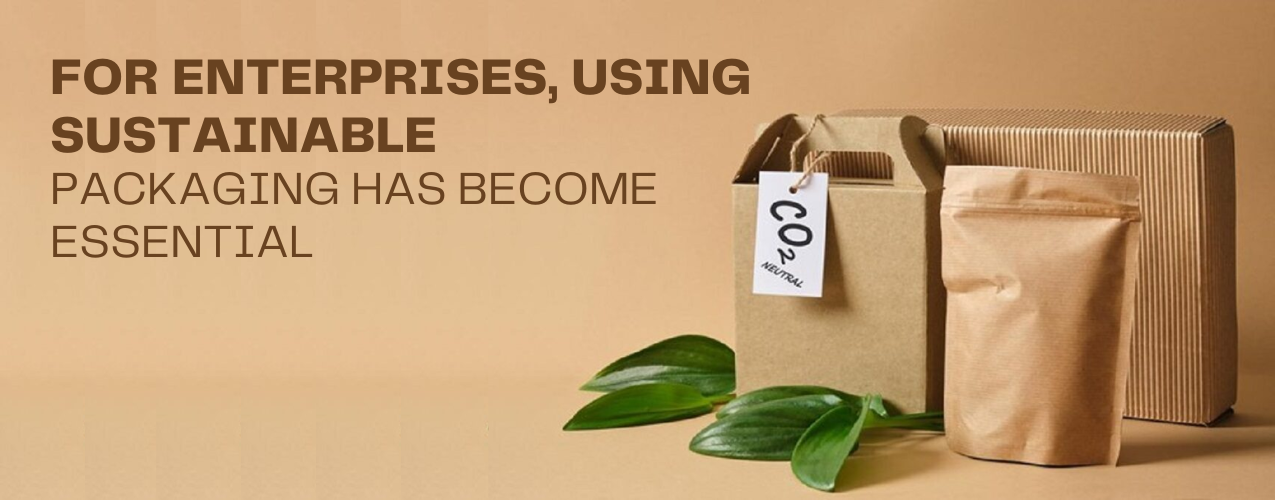In a milieu where ecological consciousness transcends obscurity to become a ubiquitous concern, corporations are increasingly impelled to reevaluate
In a milieu where ecological consciousness transcends obscurity to become a ubiquitous concern, corporations are increasingly impelled to reevaluate their operations through the prism of sustainability. Among the myriad aspects of business sustainability, packaging has ascended as a pivotal domain necessitating scrutiny. Once construed primarily as a utilitarian requisite, packaging now assumes the mantle of a potent conduit for environmental stewardship and corporate accountability. As consumers grow progressively discerning and regulations constrict, the mandate for corporations to espouse sustainable packaging practices assumes unparalleled urgency.
Grasping the Imperative
The urgency underpinning the adoption of sustainable packaging practices emanates from the exigent environmental quandaries confronting our planet. The proliferation of disposable plastics, the depletion of natural reservoirs, and the burgeoning deluge of waste suffocating our landfills and oceans have precipitated a global awakening to the imperative for change. Corporations, as significant contributors to these quandaries, find themselves under escalating scrutiny from consumers, stakeholders, and regulatory authorities alike.
Furthermore, consumer predilections are undergoing a seismic metamorphosis towards sustainability. Surveys consistently divulge an escalating cohort of consumers prioritizing eco-friendly products and evincing readiness to align their purchasing proclivities with their principles. In response, corporations must adapt or risk straying from a pivotal demographic. Sustainable packaging not only aligns with consumer expectations but also burns brand esteem and engenders customer allegiance.
The Business Rationale for Sustainability
Contrary to conventional wisdom, the adoption of sustainable packaging practices transcends mere moral imperative; it epitomizes sound business acumen. While some may perceive sustainability initiatives as a fiscal encumbrance, they can in fact yield substantial long-term dividends. By optimizing packaging materials, rationalizing processes, and curtailing waste, corporations can realize significant cost efficiencies and operational optimizations.
Moreover, sustainable packaging can confer a competitive edge in the contemporary marketplace. Enterprises that evince a steadfast commitment to sustainability differentiate themselves from their counterparts, allure environmentally conscious consumers, and access nascent markets. In an epoch where corporate social responsibility converges increasingly with profitability, sustainable packaging emerges as a strategic instrument for propelling growth and augmenting market share.
Navigating the Metamorphosis
Transitioning to sustainable packaging necessitates a multifaceted approach encompassing product innovation, material curation, supply chain orchestration, and consumer enlightenment. Corporations must evaluate extant packaging paradigms, discern areas ripe for amelioration, and formulate a comprehensive blueprint for sustainability integration.
Product innovators assume a pivotal mantle in this endeavor, tasked with striking a harmonious equilibrium between functionality, aesthetics, and environmental imperatives. By accordant precedence to recyclability, biodegradability, and renewable resources, innovators can concoct packaging solutions that obviate ecological detriment sans compromising efficacy.
Material selection constitutes another pivotal facet of sustainable packaging. Corporations must scrutinize the lifecycle of packaging materials, from inception to disposal, and accord precedence to those with trifling environmental footprints. Recycled paper, cardboard, bioplastics, and compostable materials burgeon as viable alternatives to conventional plastics and can drastically curtail carbon emissions and waste proliferation.
Supply chain governance equally assumes a critical role in the embracement of sustainable packaging practices. Corporations must collaborate with suppliers to ascertain the ethical sourcing of materials, optimize logistics to mitigate carbon emissions, and institute recycling and waste management protocols across the supply chain.
Consumer enlightenment emerges as an indispensable catalyst for fostering the widespread adoption of sustainable packaging. Corporations must forthrightly elucidate their sustainability endeavors, edify consumers regarding judicious disposal practices, and empower them to formulate judicious purchasing decisions. By enlisting consumers as collaborators in sustainability, corporations can amplify their impact and engender consequential change.
Overcoming Adversity
While the merits of sustainable packaging are manifest, corporations may grapple with sundry challenges in traversing the path to adoption. Fiscal considerations, technical constraints, and aversion to change constitute prevalent impediments necessitating redressal through ingenuity, collaboration, and stakeholder engagement.
Governmental edicts and industry benchmarks can similarly influence the uptake of sustainable packaging practices. Corporations must remain abreast of evolving statutes, proactively engage with policymakers, and advocate for measures incentivizing sustainability and leveling the playing field for conscientious enterprises.
Intra-industry collaboration assumes paramount significance in propelling systemic transformation. Corporations can harness partnerships, consortia, and industry consortia to disseminate best practices, aggregate resources, and collectively address shared challenges. By nurturing a culture of collaboration and knowledge dissemination, the industry can expedite the transition to sustainable packaging on a global scale.
In conclusion, the mandate for corporations to espouse sustainable packaging practices burgeons as an imperative. As environmental exigencies intensify, consumer predilections evolve, and regulatory strictures mount, sustainability transcends elective preference to emerge as a business exigency. By embracing sustainable packaging, corporations can assuage environmental impact, embellish brand prestige, realize cost efficiencies, and fortify their competitive posture in the marketplace. Though the transition may pose hurdles, the long-term dividends vastly outweigh the costs. Together, we can forge a more sustainable future—one package at a time.


COMMENTS